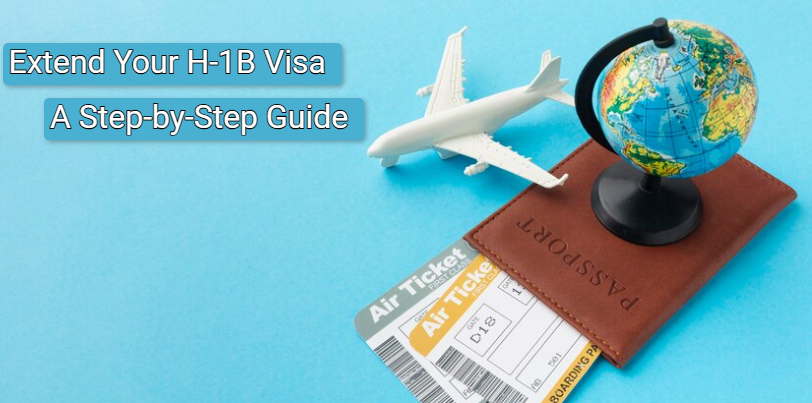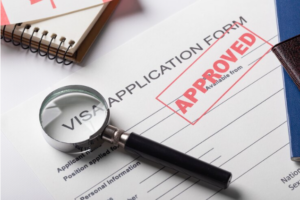How to Extend Your H-1B Visa: A Step-by-Step Guide

Are you working in the United States with an H-1B visa? Your visa may need to be extended before it expires. The H-1B extension process can look tricky, but knowing what to do makes it easier. This guide will tell you all you need to know about H-1B visa renewal. We’ll cover the documents you need when to do things, and walk you through each step.
What is an H-1B Visa?
An H-1B visa lets U.S. companies hire foreign experts in fields like tech, healthcare, finance, engineering, and other skilled jobs. The H-1B visa starts at three years but can extend to six years in total. If your job goes on longer, you might need to check out ways to renew your H-1B visa in the USA or switch to a different visa type.
Why Extend Your H-1B Visa?
H-1B visa extension matters a lot if you need to keep working in the U.S. after your first visa runs out. You’ll need to renew your H-1B visa to stay legal if your job goes on longer than your original visa or if you’re trying to get permanent residency. Also, if you want to switch to a Green Card, having a longer H-1B visa lets you stay in the U.S. while they process your permanent residency application.
Step 1: Get to Know the H-1B Visa Extension Process

The H-1B visa renewal process looks a lot like the initial H-1B visa application. Your employer needs to submit a petition to extend your H-1B visa to the United States Citizenship and Immigration Services (USCIS). The main difference? This extension lets you stay in the U.S. longer than your first visa allows without having to leave the country.
Key Points:
- You don’t have to leave the U.S. to renew your H-1B nonimmigrant visa if your employer files the petition while you’re in the country.
- Your employer must file the extension petition.
- You can ask to extend your stay for up to three years at a time.
- You can’t stay in the U.S. on an H-1B visa for more than six years unless you meet certain conditions, like applying for a Green Card.
Step 2: When to Renew Your H-1B Visa
To have a smooth extension, you need to know the right time to file for H-1B extension. You can submit your H-1B visa extension application up to six months before your current visa runs out. Filing helps you avoid any gaps in your legal status in the U.S. and keeps you working without interruption.
When to File for H-1B Visa Renewal USA
- The best time to file for H-1B visa renewal is 6 months before your visa expires.
- If you wait too long to file, you risk overstaying and losing your right to work in the U.S.
- Keep an eye on your H-1B visa expiration date and start the renewal process ahead of time.
Step 3: Meet the Eligibility Requirements for H-1B Visa Extension

To qualify for a H-1B visa extension, you need to meet these requirements:
- Current Employment: You must work in a job that qualifies for H-1B status.
- Employer Sponsorship: Your employer must back your extension application.
- Specialty Occupation: Your job must stay in a specialty field that needs expert knowledge.
Documents Needed for H-1B Visa Domestic Renewal:
Your employer has to submit several papers to USCIS to support the domestic renewal of H-1B nonimmigrant visas. These include:
- Form I-129: This serves as the petition form to extend your H-1B visa.
- Labor Condition Application (LCA): This document confirms that your employer meets the wage requirements for your job.
- Proof of Employment: You need to show pay stubs, tax returns, and other documents that prove you work in a specialty occupation.
- Degree Verification: Your educational background must match your H-1B job.
- I-94 Form: This arrival/departure record shows you entered the U.S.
Step 4: Submit the H-1B Extension Petition
After you’ve collected all the required paperwork, your employer will submit the H-1B extension request to USCIS. This application will contain the filled-out Form I-129, the approved LCA, and extra documents that prove you’re still working in a specialty job.
More Steps to Take:
- Premium Processing: If you want USCIS to review your H-1B extension request faster, you can choose premium processing. For an extra fee, USCIS promises to respond within 15 days.
- Regular Processing: If you go with regular processing, you can expect to wait 3 to 6 months to get your H-1B visa renewal approved.
Step 5: Wait for USCIS Approval

After filing the petition, you must wait for approval. You can keep working in the U.S. during this time if you submit your petition before your visa expires. USCIS will process the extension and send you an approval notice (Form I-797). This notice confirms the success of your H-1B visa renewal process.
If USCIS denies the application, you should talk to your employer or lawyer. They can help you understand why and look at possible fixes.
Step 6: What Happens If They Turn Down Your H-1B Visa Extension?
Most of the time, they approve extensions. But sometimes, they might say no to an H-1B visa extension. It’s crucial to know why they might reject it and what you can do about it.
Common Reasons They Might Say No:
- Missing or Wrong Paperwork: This is one of the main reasons they might refuse your request. For example, if your boss doesn’t send in the right Labor Condition Application (LCA), Form I-129, or proof that you still have a job, they could turn down the extension.
- Changes in Job Status: If your job duties change or don’t qualify as a specialty occupation anymore, USCIS may decide that the H-1B visa doesn’t apply to you, which can lead to a denial.
- Employer-Employee Relationship: USCIS might question if your employer-employee relationship is real if they have doubts about what you do in the company or your work arrangements.
- Immigration Violations: If you’ve broken U.S. immigration laws (like working without permission), USCIS might say no to your extension request.
What to Do If USCIS Denies Your H-1B Visa Renewal:

- Review the Denial Notice: USCIS sends a formal notice explaining why they denied your application. Read it so you understand the exact reason.
- Appeal or Refile: You might be able to appeal the decision or ask to reopen the case in some situations. If USCIS denied your petition because you missed some paperwork, you could fix the mistake and submit it again.
- Seek Legal Help: It’s a good idea to talk to an immigration lawyer if you get a denial. They can help you appeal, explain why USCIS said no, and guide you on what to do next.
Final: Extend Your H-1B Visa with Confidence
Getting your H-1B visa renewed doesn’t have to scare you. If you follow the right steps get all the documents you need, and stay on top of deadlines, you’ll have no trouble with your H-1B visa extension.
Do you need a hand with your H-1B visa renewal or want to stay longer? Our team at Passage Law is ready to help. Our immigration experts will walk you through each step, making sure your extension gets handled well. Consult us right now!
